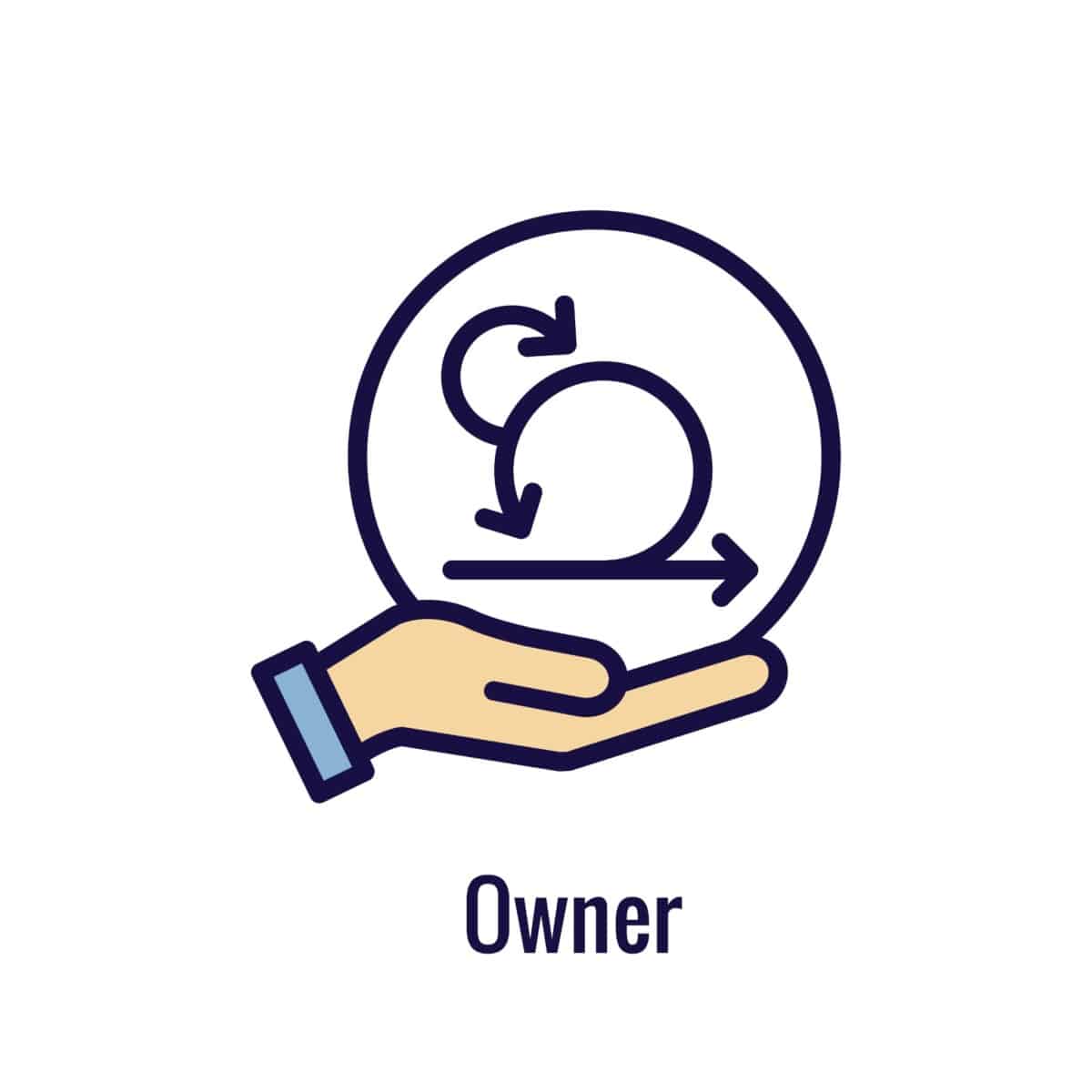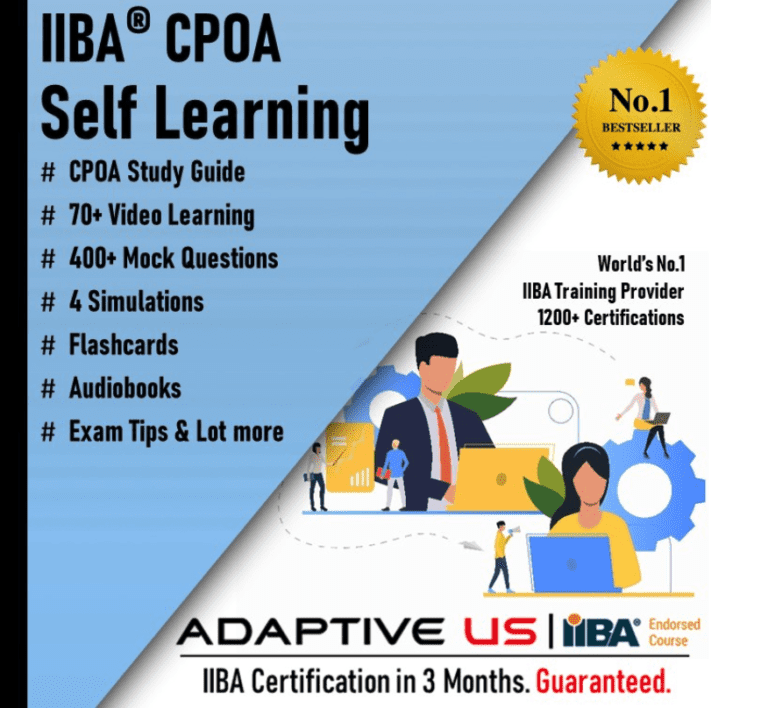From time to time especially in today’s increased awareness of agile ways of working and product management, many business analysts will ask the question or consider transitioning from a business analyst to product owner.
The need or aspiration or just being told by their organisation will be drivers to start the conversation or explore further the best way to transition.
The leap or transition from business analyst to product owner / product management may not be a huge transition as some people may think.
How quick the transition will take will depend upon each person’s starting point to start bridging the gap and start transitioning.
Table of Contents
Learn the Role of a Product Owner
Product Owner
As a product owner, your main objective is to ensure that the product that you contribute too delivers maximum value to its customers.
Some key responsibilities include:
- Uncovering the full value of the product and foster a clear vision for its use.
- Guarantee that development teams are consistently supplying product value, with the appropriate changes to keep up with current trends.
- Prioritising the backlog in order to reach business and customer objectives.
- Presenting the backlog to all stakeholders in a clear and understandable format, ensuring it is always visible and easy to interpret.
Business Analyst
A business analyst is responsible for assembling and investigating information from various sources within an enterprise. This includes tools, processes, documentation as well as stakeholders in order to identify the actual needs of all involved parties.
Business analysts are essential in bridging the gap between stakeholders and realised solutions. Key responsibilities of business analysts include:
- Understanding problems and business objectives.
- Analysing user needs.
- Determining strategies.
- Enabling change.
- Working and collaborating with stakeholders.
- Aligning stakeholder needs with solutions.
Identifying Skills Gaps to Transition from a Business Analyst to a Product Owner / Product Manager
As a business analyst transitioning to a product owner or product manager role, there may be some skills gaps that you need to address. To identify these gaps, you can start by comparing the skills and knowledge required for a product owner or product manager role to your current skills and experience as a business analyst. Some of the skills you may need to develop include:
- Product strategy: As a product owner or product manager, you will be responsible for developing and executing a product strategy
 that aligns with the company’s overall goals. This requires an understanding of the market, the customer, and the competition.
that aligns with the company’s overall goals. This requires an understanding of the market, the customer, and the competition. - Product roadmap: As a product owner or product manager you will be responsible for developing product roadmaps
 and setting direction for your product. This requires an understanding of managing priorities, stakeholders ensuring that the product is meeting customer expectations from a planning perspective.
and setting direction for your product. This requires an understanding of managing priorities, stakeholders ensuring that the product is meeting customer expectations from a planning perspective. - Product discovery: developing skills and techniques to understand the customer needs and to develop the needs into a product backlog.
- Product development: learning how to work with a product development team, typically cross-functional to lead them in the right direction to prioritise and develop the product.
- Communication: As a product owner or manager, you will need to communicate effectively with stakeholders, including the development team, senior leadership, and customers.
- Prioritisation: You will need to be able to prioritise tasks and make trade-offs when there are conflicting priorities.
- Technical skills: Depending on the product, you may need to have some technical skills or be able to work closely with technical team members.
Once you have identified the skills you need to develop, you can start working on closing the skills gaps.
Developing Knowledge of Agile Ways of Working
Developing Agile Knowledge via Websites
It is important that a business analysts gets familiar with agile ways of working so that they get familiar with agile terminology, concepts, principles, and processes. It is also important to understand the key agile roles and responsibilities.
There are some good websites that provide good basis for understanding agile, including:
From these websites a business analyst will start to under agile ways of working, value, and principles.
Developing Agile Knowledge via Podcasts
There are some good podcasts to listen to from an agile perspective including:
Developing Agile Knowledge via Agile Business Analyst Certifications
There are business analyst agile certifications that provide an agile perspective. The article provides a good range of industry certification bodies that provide very good foundational training.
International Institute of Business Analysis (IIBA)
- IIBA Agile Analysis Certification (IIBA-AAC).
- IIBA Certificate in Product Ownership Analysis (IIBA-CPOA).
British Computer Society (BCS)
- BCS Professional Certificate in Agile Business Analysis.
International Software Quality Institute
- iSQI® Certified Agile Business Analysis (CABA).
APMG International
- AgileBA Foundation Certification.
- AgileBA Practitioner certification.
Developing Agile Knowledge via Business Analysis Agile Books
There are some recommended agile business analysis books in that business analyst can read to develop their working knowledge of agile. Some useful book resources include:
in that business analyst can read to develop their working knowledge of agile. Some useful book resources include:
Developing Knowledge of Product Management Ways of Working
Developing Product Management Knowledge via Websites
There are some good websites that provide a good basis to understand more about product management, including:
- Disciplined Agile Product Management
 : Provides good articles on product management theory and practice.
: Provides good articles on product management theory and practice. - Roman
 Pilcher’s Blog:
Pilcher’s Blog: Provides useful resources and templates for product roadmaps, product visions.
Provides useful resources and templates for product roadmaps, product visions. Product School
 : Product School offers a range of courses and resources for product managers, including a certification program for aspiring product managers. They also offer free resources such as webinars and blog posts on topics such as product development, product marketing, and product strategy.
: Product School offers a range of courses and resources for product managers, including a certification program for aspiring product managers. They also offer free resources such as webinars and blog posts on topics such as product development, product marketing, and product strategy.Mind the Product
 : Mind the Product is a community of product managers that offers resources such as articles, podcasts, and events on a wide range of product management topics. They also offer training courses and workshops, as well as a job board for product management roles.
: Mind the Product is a community of product managers that offers resources such as articles, podcasts, and events on a wide range of product management topics. They also offer training courses and workshops, as well as a job board for product management roles.
Developing Product Management Knowledge via Podcasts
There are some good podcasts to listen to from a product perspective include:
- One Knight in Product
 This is a podcast aimed at people involved in designing, managing, building or marketing products.
This is a podcast aimed at people involved in designing, managing, building or marketing products. - The Product Podcast
 This podcast features interviews with product managers and other industry experts. The episodes cover a range of topics, including product roadmaps, user feedback, and metrics and KPIs.
This podcast features interviews with product managers and other industry experts. The episodes cover a range of topics, including product roadmaps, user feedback, and metrics and KPIs. - The Product Experience
 In-depth conversations with some of the best product people around the world. Every week the hosts chat with people in the know and cover the topics that matter to you – solving real problems, developing awesome products, building successful teams and developing careers.
In-depth conversations with some of the best product people around the world. Every week the hosts chat with people in the know and cover the topics that matter to you – solving real problems, developing awesome products, building successful teams and developing careers. - Roman’s Product Management
 Covers relevant topics in product management and helps explains some of Roman’s product management resources.
Covers relevant topics in product management and helps explains some of Roman’s product management resources.
Developing Product Management Knowledge via Training Courses
There are business analyst training courses that provide a product perspective such as the IIBA Certificate in Product Ownership Analysis (CPOA) . The CPOA provides business analyst professionals to gain knowledge to help transition from a business analyst to a product owner / product manager.
. The CPOA provides business analyst professionals to gain knowledge to help transition from a business analyst to a product owner / product manager.
The CPOA certification covers the role of the product owner and the techniques used to identify, prioritise, and manage requirements. The CPOA certification can help you understand the end-to-end product development process, from ideation to launch, and how to ensure that the product meets the needs of customers and stakeholders. This knowledge can help you transition from a business analyst to a product owner by developing the skills needed to lead the product development process and create value for customers and the business.
You can also consider scrum product owner training such as Professional Scrum Product Owner.
Developing Product Management Knowledge via Product Management Books
There are some recommended product management books that business analyst can read to develop their working knowledge of product management. Some useful book resources include:
that business analyst can read to develop their working knowledge of product management. Some useful book resources include:
- Strategize: Product Strategy and Product Roadmap Practices for Digital Age, by Roman Pichler

“The Lean Product Playbook: How to Innovate with Minimum Viable Products and Rapid Customer Feedback” by Dan Olsen: This book provides a detailed guide to using lean methodologies to develop successful products.
“Cracking the PM Interview: How to Land a Product Manager Job in Technology” by Gayle McDowell and Jackie Bavaro: While not specifically focused on transitioning from business analyst to product manager, this book provides valuable advice on how to prepare for a product management job interview and what skills are most in demand in the field.
“Product Management for Dummies” by Brian Lawley and Pamela Schure: This book is a comprehensive guide to the basics of product management, covering topics such as market research, product development, and product launch.
“The Product Manager’s Desk Reference” by Steven Haines: This book provides a detailed guide to the product management process, including how to identify customer needs, develop a product strategy, and launch a successful product.
Transition from Business Analyst to Product Owner
Utilising the type of learning resources listed in this blog post is a good starting point for transitioning from a business analyst to product owner / product manager.
Some considerations or next steps that you may also wish to consider include:
- Taking small incremental steps towards reaching your career development goals.
- Writing down where you are lacking and acquire knowledge on your weak areas.
- Iterate and put what you learned into practice, you may sometimes make mistakes but you’ll learn from them.
- Don’t be afraid to ask questions at work if you don’t understand something, there are no silly questions.
- Developing and expanding your professional network to learn from others. Join LinkedIn product management groups and try to be active in the groups.
- Asking for support from peers. in lunch and learn sessions or community of practice.
- Own your career and be confident with it.
- Document and communicate in your career development plan your aspiration to transition from business analyst to product owner.
- Make others in your workplace aware of your aspirations.
- Look for a good mentor or coach
 to support you on your journey.
to support you on your journey. - Look for opportunities to explore internal opportunities in your organisation to get exposure to the product management team.







